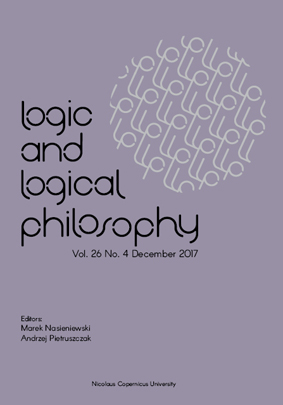The Logical Burdens of Proof. Assertion and Hypothesis
DOI:
https://doi.org/10.12775/LLP.2017.006Keywords
logic for pragmatics, assertion, hypothesis, question-answer semantics, logical oppositionAbstract
The paper proposes two logical analyses of (the norms of) justification. In a first, realist-minded case, truth is logically independent from justification and leads to a pragmatic logic LP including two epistemic and pragmatic operators, namely, assertion and hypothesis. In a second, antirealist-minded case, truth is not logically independent from justification and results in two logical systems of information and justification: AR4 and AR4¢, respectively, provided with a question-answer semantics. The latter proposes many more epistemic agents, each corresponding to a wide variety of epistemic norms. After comparing the different norms of justification involved in these logical systems, two hexagons expressing Aristotelian relations of opposition will be gathered in order to clarify how (a fragment of) pragmatic formulas can be interpreted in a fuzzy-based question-answer semantics.
References
Bellin, G., “Assertions, hypotheses, conjectures, expectations: Roughsets semantics and proof-theory”, pages 193–241 in Advances in Natural Deduction: A Celebration of Dag Prawitz’s Work, L.C. Pereira, E.H. Haeusler, V. de Paiva (eds.), “Trends in Logic”, vol. 39, Springer, Dordrecht, 2014. DOI: 0.1007/978-94-007-7548-0_10
Bellin, G., M. Carrara, D. Chiffi, D., and A. Menti, “Pragmatic and dialogic interpretations of bi-intuitionism. Part I”, Logic and Logical Philosophy 23, 4 (2014): 449–480. DOI: 10.12775/LLP.2014.011
Bellin, G., M. Carrara, and D. Chiffi, “On an intuitionistic logic for pragmatics”, Journal of Logic and Computation, exv036 (2015). DOI: 10.1093/logcom/exv036
Carrara, M., D. Chiffi, and C. De Florio, “Assertions and hypotheses: A logical framework for their opposition relations”, Logic Journal of the IGPL 25, 2 (2017): 131–144. DOI: 10.1093/jigpal/jzw036
Carrara, M., and D. Chiffi, “The knowability paradox in the light of a logic for pragmatics”, pages 47–58 in Recent Trends in Philosophical Logic, R. Ciuni, H. Wansing, and C. Willkommen (eds.), “Proceedings of Trends in Logic XI”, Studia Logica Library, “Trends in Logic”, vol. 41, Springer, Berlin, 2014. DOI: 10.1007/978-3-319-06080-4_3
Carrara, M., D. Chiffi, and D. Sergio, “Knowledge and proof: a multimodal pragmatic language”, pages 1–13 in Logica Yearbook 2013, V. Punčochář and M. Dančák (eds.), College Publication, London, 2014.
Dalla Pozza, C., and C. Garola, “A pragmatic interpretation of intuitionistic propositional logic”, Erkenntnis 43 (1995): 81–109. DOI: 10.1007/BF01131841
Dugundji, J., “Note on a property of matrices for Lewis and Langford’s calculi of propositions”, The Journal of Symbolic Logic 5, 4 (1940): 150–151. DOI: 10.2307/2268175
Schang, F., “Abstract logic of oppositions”, Logic and Logical Philosophy 21 (2012): 415–438. DOI: 10.12775/LLP.2012.019
Schang, F., “A four-valued strong implication”, 2017 (unpublished manuscript).
Schang, F., and A. Costa-Leite, “Une sémantique générale des croyances justifiées”, CLE 16, 3 (2016).
Shramko, Y. “Dual intuitionistic logic and a variety of negations: the logic of scientific research”, Studia Logica 80, 2–3 (2005): 347–367. DOI: 10.1007/s11225-005-8474-7
Shramko, Y., “A modal translation for dual-intuitionistic logic”, The Review of Symbolic Logic 9, 2 (2016): 251–265. DOI: 10.1017/S1755020316000022
Smessaert, H., “On the 3D visualization of the logical relations”, Logica Universalis 3 (2009): 212–231. DOI: 10.1007/s11787-009-0010-5
Downloads
Published
How to Cite
Issue
Section
Stats
Number of views and downloads: 808
Number of citations: 5







